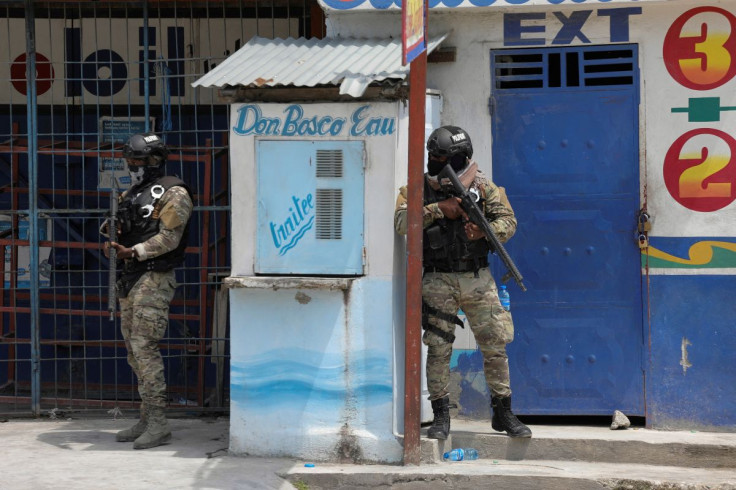
Latin America and the Caribbean closed 2023 with over 115,000 murders, according to a recent report by specialized outlet InSight Crime, which warned that the actual figure is likely higher as data in many countries is "missing or unreliable."
The report divided its analysis into three: South America, Mexico and Central America and The Caribbean. Overall, none of the subregions showed a clear trend. A series of countries recorded a large increase in homicides (Ecuador, Haiti, Costa Rica) while others saw substantial drops (El Salvador, Venezuela, Paraguay, Peru). The rest showed slight variations.
Delving into each region, InSight crime highlighted that "criminal disputes over trafficking routes were the primary driver of violence in South America this year," a result of increased cocaine production and high drug prices and other major consumer markets.
"Ecuador, in particular, had its most violent year on record, while trafficking groups continue to fight in Colombia, the world's biggest cocaine producer," added the report. Looking at Ecuador specifically, the country had a homicide rate of 44.5 people per 100,000 last year, a 74.5% increase compared to the year prior.
This was the highest rate of any country in Central or South America. "The country's descent into chaos has been sudden, with the homicide rate increasing eightfold in just five years. But the explosion of violence has been decades in the making and is now driven by drug trafficking groups competing over strategic routes," InSight Crime said.
The trend is not changing, as violence has continued this year, with gangs "launching several attacks, including storming a live news broadcast, rioting in prisons, and attacking police." As a result, President Daniel Noboa has implemented a series of hardline measures to crack down on the gangs, but it's still early to tell whether they will be successful.
Venezuela and Colombia followed Ecuador with homicide rates between 20 and 30 per 100,000, while Paraguay, Chile and Peru were on the other end of the spectrum with rates lower than 10.
The report highlighted that Paraguay and Peru in particular "saw significant improvements in homicide rates despite their continuing roles as drug transit and production centers."
Looking at Mexico and Central America, a notable disparity arises: "Honduras and El Salvador, which have often been the most violent countries in Central America, took similar approaches to security policy in 2023, with very different results."
Moreover, Costa Rica saw a 41% increase in homicides after struggling to control a rise in cocaine trafficking through its ports. Mexico still has challenges dealing with violence "as criminal groups compete over fentanyl and human trafficking routes."
Analyzing the contrast between Honduras and El Salvador, the report says that even though the former's rate decreased 13% last year, it remained "extremely violent" with a rate over the median. (31.1 vs. 20).
"While President Xiomara Castro's heavyhanded approach has suspended rights and focused on hitting gangs in the country's most violent hotpots, the approach has made scant progress against organized crime."
El Salvador, in turn, saw a 69.2% decrease in its homicide rate, clocking in at 2.4 per 100,000, the lowest in Latin America. The country had over 100 murders per 100,000 people in 2015.
"The historic lows come as the Bukele government continues a ruthless crackdown against the MS13 and Barrio 18 street gangs. The government has arrested 70,000 people — over 1% of the country's population of 6.3 million — since the controversial crackdown began in early 2022, effectively wiping out gang activity in the process," InSight Crime reported.
However, the report noted that some have cast doubt on the data, saying that the "e Observatory of Human Rights of the Central American University says figures are highly underreported, and the criminologist Carlos Carcash emphasizes that figures do not include deaths of gang members and deaths at the hands of authorities."
Most of the region's countries with higher rates were in the Caribbean. "Awash with guns, local gangs fighting for control of cocaine and arms trafficking propel violence in many Caribbean nations, which are also regularly afflicted by natural disasters," the report said.
However, it warned, the rates must be "taken with a grain of salt," as their small populations mean that high rates can be the result of isolated outbreaks of violence. In fact, it said, many countries made progress in 2023, significantly reducing their homicide rates — in part due to new security programs.
St. Kitts and Nevis had the Caribbean (and the region's) highest rate, with 65 per 100,000. It was followed by Jamaica, with 60.9. Particularly noteworthy is the surge of violence in Haiti, which experienced a 126% increased in 2023.
"Violence — in many forms — has been spiraling out of control since the assassination of Haiti's President Jovenel Moïse in 2021. With the state unable to protect its citizens, vigilante groups began extrajudicial killings of alleged gang members," InSight Crime noted.
Moreover, the UN's international support mission led by Kenya, which has already faced challenges even before being deployed, doesn't have much support from experts, the report added.
Haiti's government in fact declared a state of emergency on Sunday, following a surge of violence that led to a weekend jailbreak, allowing inmate gang members to escape from the nation's two largest prisons.
© 2025 Latin Times. All rights reserved. Do not reproduce without permission.






